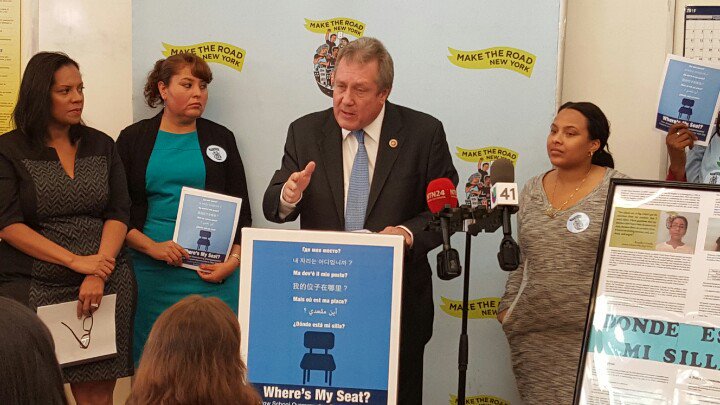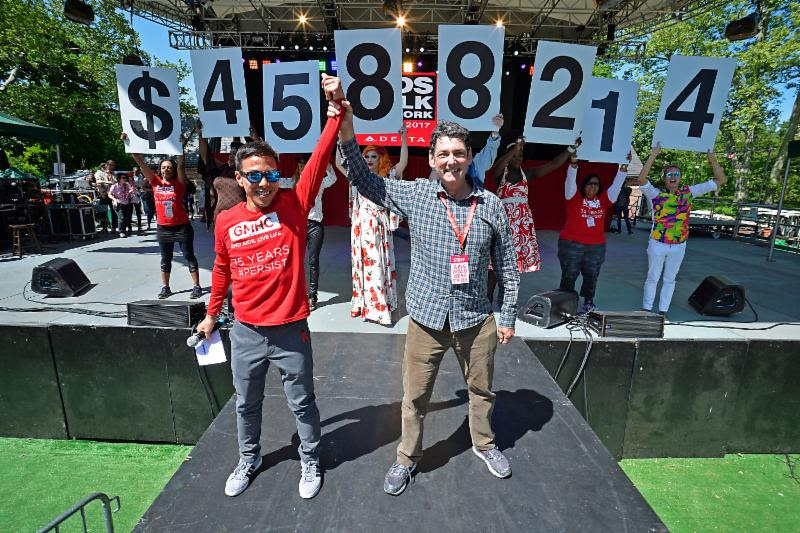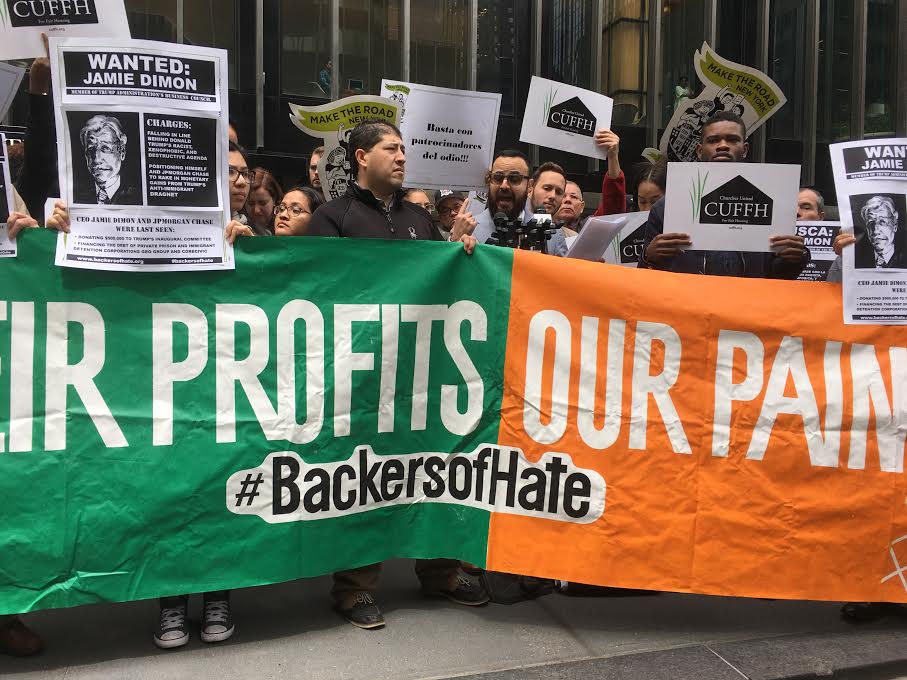Now More Than Ever, the City Must Invest in Adult Literacy

Council Member Dromm, one of the authors (photo: Make The Road NY)
Three million immigrant New Yorkers currently call our city home, adding to its vibrancy and vitality. Since Donald Trump’s election, immigrant communities have been fearful: hate crimes have gone up, immigrant workers face more exploitation, and families are scared of separation and deportation. For those of us working as community advocates and elected officials, we are now driven more than ever to find the policy solutions that will help our immigrant communities thrive and remain resilient, rather than live in fear.
Mayor de Blasio and City Council leaders have taken policy positions that do just that: committing to non-cooperation with Immigration and Customs Enforcement (ICE), pioneering an IDNYC program, maintaining strong worker protections, and increasing funding for universal pre-kindergarten (UPK) and the Community Schools initiative. Now, to more effectively protect and support our communities, we also need to deepen our investment in adult education and baseline in into the city budget.
Just a year ago the Mayor and Council invested $12 million for adult literacy, an increase that advocates called historic at the time. City leaders invested because the need is great, and for the thousands who study every year, the English classes offered by adult literacy providers give immigrants a pathway to economic mobility, social integration, parental support of children’s academic success, improved health outcomes, and greater civic engagement.
As immigrant communities live in fear and anxiety over federal immigration policy, it is essential that they are able to read and understand English—even as our city government is defending their rights and providing some protective services. Without English proficiency, many immigrants are left isolated and at risk of being taken advantage of by unscrupulous “notarios” who promise immigration relief for a fee, but never deliver. They are even more fearful than ever of accessing health and social services, challenged when applying for or improving work, and less able to support their children’s learning, or to report or stand up against employer, landlord, or police abuses.
Under the Trump administration, New York City’s largest source of federal adult literacy dollars (WIOA) is at risk of significant cuts. Even if the funding is maintained at a reduced level, current policy will likely make it more difficult to serve undocumented and low-level learners over time. For all of these reasons, this is the moment for the Mayor and Council to build on the momentum from last year’s investment and use their leadership to make New York City a model of adult literacy service provision. It is not too late, despite the fact that the Mayor’s most recent Executive Budget did not renew last year’s $12 million investment in adult literacy. A budget deal must be reached by July 1. The time is now.
Without the $12 million again this year, spots will be lost in literacy classes for over 5,500 adult students throughout the city, and an opportunity to deeply support immigrant New Yorkers will be lost. Last fiscal year's investment was critical to providers and students, and should be transformed into a baselined, multi-year investment in the field of adult education, allowing the city to update reimbursement rates for community based providers offering cost effective and critical services. In order to make our city a true 'sanctuary' city, we need to make it a city of opportunity for immigrants by ensuring that they have access to the literacy classes they need to thrive now.
***
Daniel Dromm is a member of the New York City Council. Theo Oshiro is the Deputy Director of Make the Road New York. On Twitter: @Dromm25 & @TheoOshiro.
***
Have an op-ed idea or submission for Gotham Gazette? Email This email address is being protected from spambots. You need JavaScript enabled to view it.
Mental Health Care is Key to Ending AIDS

Kelsey Louie (left), the author, at the AIDS Walk (photo: Matthew McDermott)
From the days when HIV/AIDS first emerged, people living with HIV/AIDS faced horrible stigma, discrimination, hatred and rejection. Those touched by the epidemic also experienced trauma and depression. The emotional pain was searing; with little warning, AIDS robbed thousands of their family members, lovers, neighbors, and colleagues. People dealt with the shattering pieces of their lives as best as they could, often alone, and often with no professional help of any kind.
When Gay Men’s Health Crisis (GMHC), the first HIV/AIDS service organization in the world, was founded in 1981, services were developed based on the immediate needs of people coming through the doors, people with symptoms of AIDS, those who cared about people infected and affected, and the general public. Some came in need of care and support, others came for information or for assistance with grief due to the death of a loved one. In response, services were developed including a hotline to provide information, support groups for people with AIDS, buddy programs to provide care partners to the ill, and support groups for the families of people with AIDS or for those who were left behind after the AIDS death of a loved one.
Trained mental health professionals volunteered to facilitate many different types of support groups under the direction of a salaried clinical supervisor. People with AIDS were struggling with the psychological stress of an AIDS diagnosis, fueled by stigma, discrimination, anxiety, despair, and confusion. Short-term individual counseling was set up for people living with HIV to respond to those with urgent mental health needs, especially for those with AIDS Dementia Complex. At that time, GMHC’s primary jobs were to assist people to die with as much dignity as possible, to help those grieving the loss of a loved one to AIDS, and to provide all, including the broader public, with information about HIV/AIDS.
As new HIV medications were becoming available in the mid-1990s, GMHC’s group and individual counseling services continued to evolve. While HIV’s threat to a person’s physical health was well known, its impact on mental health was less clear, under-publicized, and not adequately researched. GMHC’s mission quickly changed; now it was our job to assist people to live with dignity—it is a mission that continues today.
Research shows a strong correlation between mental health disorders and people living with HIV and AIDS, a correlation that is often overlooked. According to the National Institute of Health, people with HIV have an increased risk for developing mood, anxiety and cognitive disorders, and are twice as likely to live with depression compared to those who do not have HIV. A 2010 United Kingdom study showed that one third of HIV-positive men who participated in the survey met the criteria for a post-traumatic stress disorder diagnosis.
For those living with HIV/AIDS, depression is more than just mental hell: it can be a silent killer. Studies show that if people living with HIV feel stigmatized or suffer from mental illness, they are less likely to take their medication properly, which not only puts their own health at risk by not suppressing the individuals’ viral load, but also raises the likelihood that they pass HIV on to others. Individuals living with HIV and depression are also more likely to think about suicide or even attempt to take their own lives.
Despite what we know about the connection between mental health and HIV/AIDS, too few people living with HIV/AIDS, and those invested in their health and happiness, are getting the mental health support they need. That is why we are proud to announce the opening of the state-of-the-art GMHC Carl Jacobs Mental Health Clinic, which will allow us to incorporate innovative treatment and counseling into our service model. Services will be available to adult New Yorkers of all sexual orientations, gender identities, and income levels, regardless of HIV status.
Past traumas, stress, depression, reduced self-esteem, and other challenges can be grueling to deal with. We aim to offer holistic services that address not only our clients’ mental health issues, but their social, spiritual, and health concerns as well. Meanwhile, the ability to reach more HIV-negative people with HIV preventative interventions and mental health services will allow us to help decrease new HIV infections.
It is now more than 35 years since the emergence of HIV/AIDS in the United States. New tools like PEP and PrEP mean we are closer than ever to ending the epidemic. But that dream will not become a reality until all people living with HIV/AIDS have access to the mental health care and services they need and deserve.
***
Kelsey Louie is the CEO of GMHC. On Twitter @KelseyLouieGMHC and @GMHC.
***
Have an op-ed idea or submission for Gotham Gazette? Email This email address is being protected from spambots. You need JavaScript enabled to view it.
New York Must Take Action Against Corporate Backers of Hate

Assemblymember Moya, the author, speaks at a rally (photo: Make The Road New York)
Make the Road New York and the Center for Popular Democracy recently exposed President Trump’s corporate “backers of hate,” companies that stand to profit off an agenda so steeped in hate, prejudice, and greed, you would have to be willfully blind not to see it.
Nothing is more dangerous than business as usual when it is conducted in a moral vacuum, and these companies have been more than happy to go along for the ride: Goldman Sachs, Blackstone, JPMorgan Chase, Wells Fargo, Blackrock, Boeing, IBM, Uber, and Disney all seem eager to cash in on the Trump agenda.
Whether it's financing or investing in the detention centers necessary for Trump’s immigration crackdown, bidding on contracts with Immigrations and Customs Enforcement or Customs and Border Protection, supporting Trump’s campaign and inauguration, or spearheading an anti-worker agenda, the corporations share one commonality: they enable the most destructive and hateful policies of this White House.
Because Trump is great for business when that business is locking up people of color behind bars for petty crimes, and standing to gain from their imprisonment - as it is for JPMorgan Chase. A Trump White House is great for business when you stand to profit from breaking up unions, rolling back workers’ rights, and squeezing more from the middle-class. As for the overwhelming majority of Americans, those living paycheck to paycheck, struggling to afford their kid’s college education, or bracing for the sharp cuts to their health care, they are on the opposite side of that transaction; their pain is another’s profits.
The Backers of Hate campaign urges these corporations to reverse course, until they are no longer accessory to the crimes against the disappearing middle class, against the Muslims targeted by Trump’s travel ban, and to the immigrants living in constant anxiety that today will be the last day they’ll see their family.
And although these companies may not be swayed by the moral argument, they will listen when it comes to their almighty dollar. The Trump resistance must expand to include resisting his enablers. Consumers will need to apply the pressure where they can until condoning the Trump agenda is no longer a profitable business model.
But they don’t need to fight goliath alone.
As the finance capital of the world, New York not only has an obligation to pressure these companies, it has leverage. Our state pension fund is the third largest in the United States, with assets totaling $178.6 billion. In the weeks to come, I will introduce legislation in the state Assembly to divest that pension fund from companies guilty of the most egregious corporate complicity.
New York needs to lead the effort and draw a line in the sand. If you choose to benefit from the broad net Trump has given immigration enforcement agencies, from the deregulation and right-to-work campaigns that will bleed the middle class, or from the environmental degradation that endangers all of our futures, you’ve chosen to build upon a morally dubious house of cards. If New York is to truly stand in resistance to the Trump agenda, it’s time to put its money where its mouth is and disassociate itself from the backers of hate.
***
Francisco P. Moya is a New York State Assemblymember representing the 39th District in Queens and is the prime sponsor of the NYS Liberty Act and the NY DREAM Act. On Twitter @FranciscoPMoya.
***
Have an op-ed idea or submission for Gotham Gazette? Email This email address is being protected from spambots. You need JavaScript enabled to view it.




